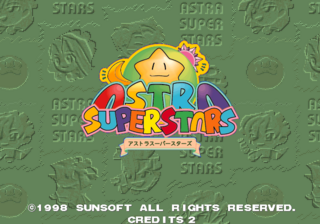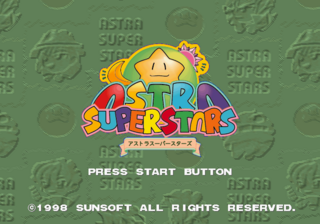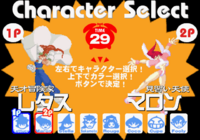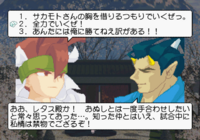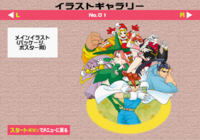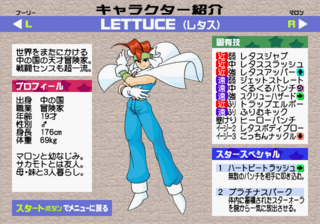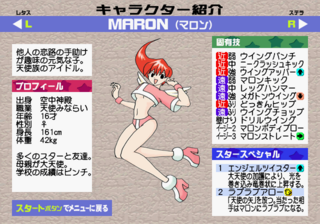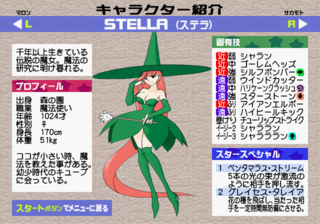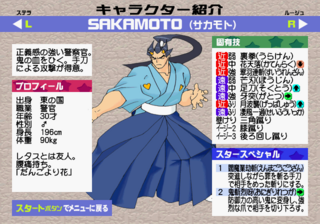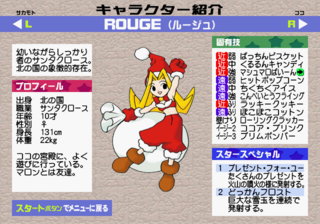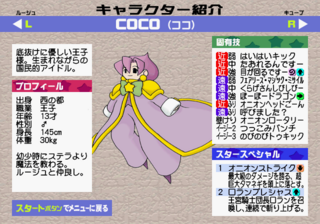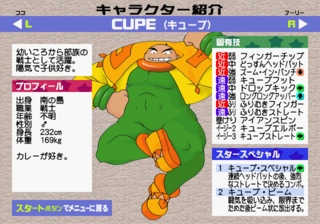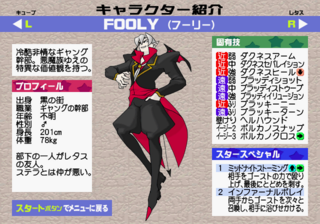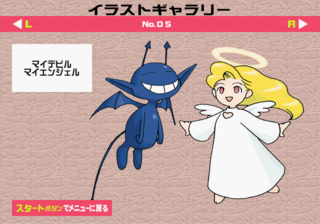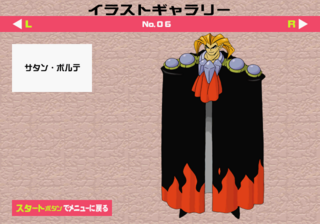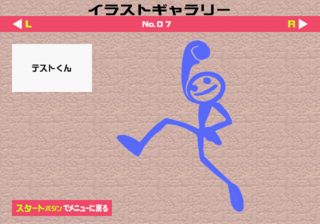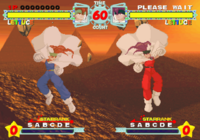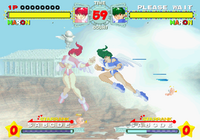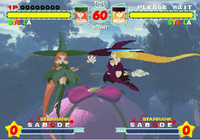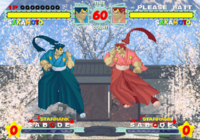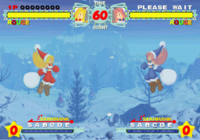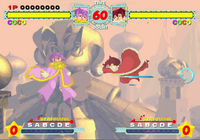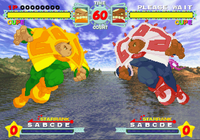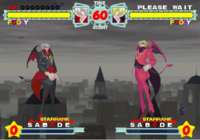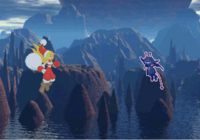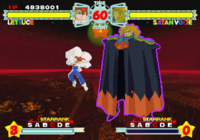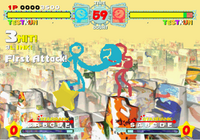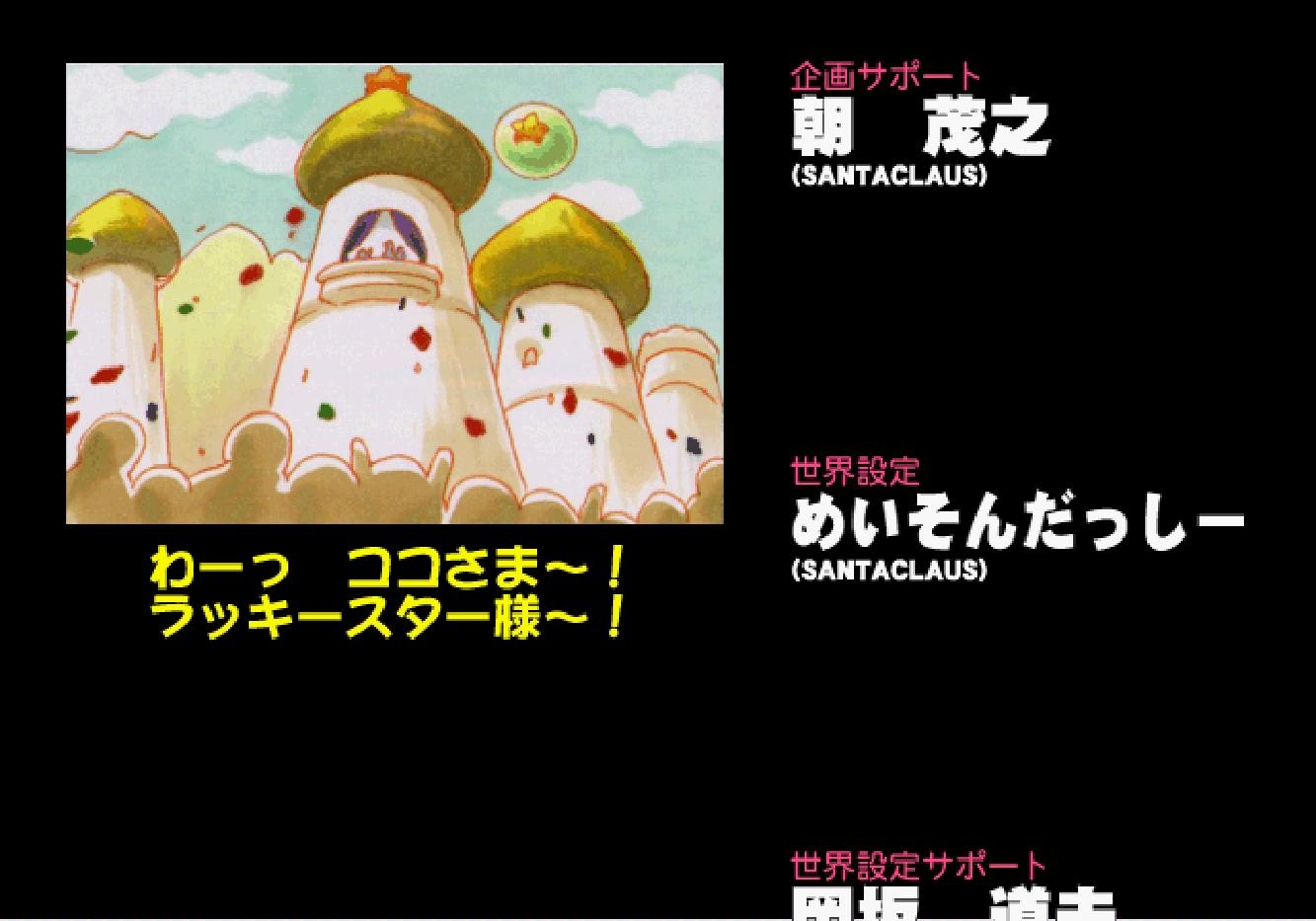Difference between revisions of "Astra Superstars"
From Sega Retro
m (Text replacement - "{{ExtraTable\|console=SAT\|region=JP\| {{ExtraTableRow\|(.*)\|TXT \(Abstract\).* {{ExtraTableRow\|(.*)\|TXT \(Bibliographiced\).* {{ExtraTableRow\|(.*)\|TXT \(Copyright\).* }}" to "{{CDROMID | absname=$1 | abs= | bibname=$2 | bib= | cpyname=$3 | cpy= }}") |
|||
| Line 308: | Line 308: | ||
==Technical information== | ==Technical information== | ||
{{mainArticle|{{PAGENAME}}/Technical information}} | {{mainArticle|{{PAGENAME}}/Technical information}} | ||
| − | |||
| − | |||
| − | |||
| − | |||
| − | |||
| − | |||
| − | |||
| − | |||
| − | |||
| − | |||
| − | |||
| − | |||
| − | |||
| − | |||
| − | |||
| − | |||
| − | |||
| − | |||
| − | |||
==References== | ==References== | ||
Latest revision as of 13:04, 20 September 2024
| ||||||||||||||
| Astra Superstars | ||||||||||||||
|---|---|---|---|---|---|---|---|---|---|---|---|---|---|---|
| System(s): Sega Titan Video, Sega Saturn | ||||||||||||||
| Publisher: Sunsoft | ||||||||||||||
| Developer: Sunsoft, Santaclaus | ||||||||||||||
| Sound driver: SCSP (1 track) | ||||||||||||||
| Peripherals supported: Extended RAM Cartridge (1MB/4MB) | ||||||||||||||
| Genre: Fighting Action/Taisen Action (対戦アクション)[1], Action[2] | ||||||||||||||
| Number of players: 1-2 | ||||||||||||||
|
Astra Superstars (アストラスーパースターズ) is a fighting game for the Sega Saturn and Sega Titan Video arcade hardware. It was illustrated and designed by Santaclaus and developed and published by Sunsoft. It was only released in Japan.
Contents
Story
The champions of a magical kingdom are competing with each other to challenge the evil Satan Volte and put an end to his reign of terror.
Gameplay
Astra Superstars is an airborne fighting game. The basic mechanics are similar to other 2D fighting games (including Sunsoft's own Galaxy Fight and Waku Waku 7), except all battles take place in the sky with the fighters floating in midair in a manner inspired by anime such as Dragon Ball Z. This allows more freedom of movement for the fighters, with the ability to "jump" both above or below each other. Unlike most fighting games, characters have normal moves and "super" moves that require building up a meter to use but no special moves. The goal of each round is to knock out the opponent, and each match is fought to the best of three rounds. Part of the health meter is green after taking damage, and this portion regenerates over time. Rounds are timed, and if time runs out, a judge determines the winner.
Characters are moved with ![]() or
or ![]() and dash with
and dash with ![]()
![]() or
or ![]()
![]() . Continuing to hold the direction during a forward dash continues the dash until the button is released, or the dash can be canceled early by pressing in the opposite direction. The playfield has three levels, with battles taking place primarily in the middle level. Characters can ascend into the air with
. Continuing to hold the direction during a forward dash continues the dash until the button is released, or the dash can be canceled early by pressing in the opposite direction. The playfield has three levels, with battles taking place primarily in the middle level. Characters can ascend into the air with ![]() ,
, ![]() , or
, or ![]() or swoop down with
or swoop down with ![]() ,
, ![]() , or
, or ![]() . They quickly return back to the middle level after leaving it, similar to the effect of gravity on a jump in a conventional fighting game. Holding the direction floats in that direction for longer before returning, and characters can dash at any level. Like jumping, these maneuvers can be used to close distance, dodge attacks, or move to the other side of the opponent. When next to the opponent, the player can "turn behind" the opponent (move to the other side of the opponent) by holding the D-Pad forward and pressing
. They quickly return back to the middle level after leaving it, similar to the effect of gravity on a jump in a conventional fighting game. Holding the direction floats in that direction for longer before returning, and characters can dash at any level. Like jumping, these maneuvers can be used to close distance, dodge attacks, or move to the other side of the opponent. When next to the opponent, the player can "turn behind" the opponent (move to the other side of the opponent) by holding the D-Pad forward and pressing ![]() .
.
Characters attack with ![]() or
or ![]() for a light attack,
for a light attack, ![]() or
or ![]() for a medium attack, or
for a medium attack, or ![]() or
or ![]() for a heavy attack. The kinds of attacks performed vary depending on the character, but generally the
for a heavy attack. The kinds of attacks performed vary depending on the character, but generally the ![]() ,
, ![]() , and
, and ![]() buttons correspond to punches and the
buttons correspond to punches and the ![]() ,
, ![]() , and
, and ![]() buttons are used for other attacks. Light attacks are quicker and can be linked easily into combos, while heavy attacks do more damage and usually send the opponent flying across the stage and bouncing off the side of the screen. Characters do not have special moves that are performed using special button combinations, as in most other fighting games, but many of the normal moves have characteristics similar to special moves such as launching projectiles or knocking the opponent upward or downward.
buttons are used for other attacks. Light attacks are quicker and can be linked easily into combos, while heavy attacks do more damage and usually send the opponent flying across the stage and bouncing off the side of the screen. Characters do not have special moves that are performed using special button combinations, as in most other fighting games, but many of the normal moves have characteristics similar to special moves such as launching projectiles or knocking the opponent upward or downward.
Characters can guard by holding the D-Pad back. Guarding can be done while ascending or descending. If a character guards too many attacks in a short span of time, the guard breaks, briefly stunning the character. A character becomes dizzied after being hit by multiple successive attacks. Moving the D-Pad and pressing the attack buttons rapidly recovers more quickly. Hitting the opponent with an attack that knocks them away while they are stunned (either from a guard break or being dizzied) causes cause the opponent to bounce around the screen like a pinball. After being launched into the side of the screen by an attack, characters can recover by grabbing the wall (instead of bouncing off) by holding the D-Pad back and pressing any attack button or with a flying counterattack by holding the D-Pad forward and pressing any attack button.
A "Star Rank" meter for each character appears on the bottom of the screen, which fills with energy as the character attacks, blocks, or takes damage. Landing the first hit in a round gains a third of the meter. Once the meter is filled, it resets and a stock of meter is saved. Up to three stocks can be held in reserve, and these are carried over between rounds of a match. A stock of meter can be spent to perform a super move called a "Star Special." These moves are flashier and do more damage than regular moves. Each character has two Star Specials, one performed with ![]() +
+![]() and one performed with
and one performed with ![]() +
+![]() . Alternatively, a stock of meter can be spent to "Speed Up" by pressing
. Alternatively, a stock of meter can be spent to "Speed Up" by pressing ![]() +
+![]() , which causes the character to glow for a duration. While this effect is active, the recovery time of attacks is reduced, allowing moves to be linked together into combos more easily (similar to Custom Combos in Street Fighter Alpha 2).
, which causes the character to glow for a duration. While this effect is active, the recovery time of attacks is reduced, allowing moves to be linked together into combos more easily (similar to Custom Combos in Street Fighter Alpha 2).
Players are given a letter rank (S, A, B, C, D, or E) depending on their performance in a match, which appears above the Star Rank meters and updates in real time. This rank affects the judgment if time runs out.
Modes
The Saturn version has the following modes:
- Story Mode: The main single-player mode. The player chooses a character, then fights a match against all eight playable characters (with the last match being a mirror match against a duplicate of the chosen character). Each battle is preceded by a brief dialogue scene with the opponent. In each conversation, the player is prompted to choose of three responses, where one choice "Heats Up" (strengthens) the opponent, one choice is neutral, and one choice "Cools Down" (weakens) the opponent. After defeating all of the playable characters, the player fights a single-round "bonus" battle against the boss Satan Volte. If victorious, there is a final "exhibition" match against the test character Test-kun. The game ends if the player loses a match. It can be continued any number of times, except the match against Satan Volte, which cannot be continued. The game shows the ending for the character if the player loses against Satan Volte or wins against Test-kun. A second player can enter the game to challenge the first player to a match by pressing START at any time.
- 1P vs 2P: A two-player versus mode where players choose their characters to play and a stage, then fight a match against each other.
- 1P vs COM: A one-player versus mode where the player chooses a character to play, an opponent, and a stage, then fights a match against a computer-controlled opponent.
- COM vs COM: A watch mode where the player chooses two characters and a stage and watches two computer-controlled characters fight a match.
- Watch Mode: A watch mode where the player watches matches between randomly selected characters on randomly selected stages.
- Character Profile: A gallery of profile pages for all of the playable characters.
- Illust Gallery: A gallery of artwork. This mode is unlocked after completing the Story Mode with any character.
There are eight difficulty levels for computer-controlled opponents, and players can change the time limit (30, 60, or 90 seconds or unlimited).
Characters
Playable
Players can choose between four different color schemes for each character by pressing ![]() or
or ![]() on the character select screen.
on the character select screen.
| Lettuce (レタス) | |
|---|---|
|
Origin: China Age: 19 Height: 176 cm Weight: 69 kg | |
| A sprightly adventurer and skilled fighter from China who travels the world. He is friends with Sakamoto and has known Maron since they were children. | |
| Maron (マロン) | |
|
Origin: The Sky Temple Age: 16 Height: 161 cm Weight: 42 kg | |
| A happy but naïve teenage angel student who aims to become the highest-ranking angel. Her hobby is helping others find love. Her mother is an archangel. | |
| Stella (ステラ) | |
|
Origin: Forest Garden Age: 1,024 Height: 170 cm Weight: 51 kg | |
| A legendary witch who has lived for over a thousand years. She wields a magical wand with a sentient white glove attached to it. She devotes herself to the study of magic and taught Coco magic when she was little. | |
| Sakamoto (サカモト) | |
|
Origin: Eastern Country Age: 30 Height: 196 cm Weight: 90 kg | |
| A police officer with a strong sense of justice. He has the blood of a demon and can shapeshift into an enormous oni. He is friends with Lettuce. | |
| Rouge (ルージュ) | |
|
Origin: Northern Country Age: 10 Height: 131 cm Weight: 22 kg | |
| A young girl who wears a Santa Claus outfit (in reference to the game's illustrator Santaclaus). She fights using a bag full of tricks that also functions as a mode of transportation. She is friends with Coco and Maron. | |
| Coco (ココ) | |
|
Origin: Western City Age: 13 Height: 145 cm Weight: 30 kg | |
| A young, soft-hearted, and flamboyant sorcerer who is the crown prince of Onion Country. He learned magic from Stella when he was a child, and he is good friends with Rouge. | |
| Cupe (キュープ) | |
|
Origin: Southern Island Age: Unknown Height: 232 cm Weight: 169 kg | |
| An enormous, bald-headed giant who is a warrior for his tribe. He is cheerful and loves children. | |
| Fooly (フーリー) | |
|
Origin: Black City Age: Unknown Height: 201 cm Weight: 78 kg | |
| A ruthless and heartless gang leader who is a member of the demon race. One of his subordinates is a friend of Lettuce. He does not get along with Stella. |
Bosses
These characters are not playable, except for Test-kun, who is playable outside of the Story Mode in the Saturn version.
| My Devil (マイデビル) / My Angel (マイエンジェル) | |||||||||
|---|---|---|---|---|---|---|---|---|---|
| A devil or an angel that transforms into the player's character for a mirror match. Whether a devil or an angel appears depends on the dialogue choices that the player has made up to this point, with the angel requiring particular responses to meet. Appears as the eighth opponent. | |||||||||
| Satan Volte (サタン・ボルテ) | |||||||||
| A huge demon who is the King of the Demon World. Only his head is vulnerable. Appears as the ninth opponent. His battle consists of a single round, and the player only has one chance to defeat him or the game ends. He is not playable. | |||||||||
| Test-kun (テストくん) | |||||||||
A stick figure test character, similar to Bonus-kun from Galaxy Fight and Waku Waku 7. Appears as the final opponent if the player defeats Satan Volte. It is only playable in the versus modes of the Sega Saturn version.
|
Stages
Every character has his or her own stage when faced in the Story Mode. The stage can be selected in the other modes.
(スカッとコンチクショー!)
(歌わずにはいられない!)
(伝説の大魔法使い)
(鬼なれど、もののふ)
(小さなサンタクロース)
(ほわほわ王子様)
(空腹戦士の昼下がり)
(グレイッシュ・ラプソディ)
(心の悪魔 / 心の天使)
(さあ、我を楽しませてくれ)
(旅立つキミの為に…)
Production credits
- Planning: 岡坂 道夫(SANTACLAUS), めいそんだっしー(SANTACLAUS)
- Planning Support: 朝 茂之(SANTACLAUS)
- World Design: めいそんだっしー(SANTACLAUS)
- World Design Support: 岡坂 道夫(SANTACLAUS)
- Game Programming: 岡坂 道夫(SANTACLAUS)
- Character Design: めいそんだっしー(SANTACLAUS)
- Background CG Design: 岡坂 道夫(SANTACLAUS)
- Graphic Design: 朝 茂之(SANTACLAUS), めいそんだっしー(SANTACLAUS), 齋藤 真紀(SANTACLAUS), 望月 綾子(SANTACLAUS)
- Graphic Assist: 村田 信夫(SANTACLAUS)
- Illustration: めいそんだっしー(SANTACLAUS)
- Music: 二井 和男(SUNSOFT), 高田 敦司(SUNSOFT), 浅野 論(SUNSOFT)
- Sound Effect: 浅野 論(SUNSOFT)
- Recording: 高田 敦司(SUNSOFT), 二井 和男(SUNSOFT)
- Voice Actor: 藪下 貴子, 堀田 和則, 益田 真理子, おおみ ちとせ, 斧 篤, 高橋 充, 杉浦 俊, 浅井 たかえ
- Vocal: 黒田 やよい
- Sound Coordinate: 見廣 篤(PHASE OUT)
- Sales and marketing: 河合 正人(SUNSOFT), 門脇 清次(SUNSOFT), 横地 宏和(SUNSOFT), 高橋 英昭(SUNSOFT), 高橋 広志(SUNSOFT)
- Sales Promotion: 森 達男(SUNSOFT), 今関 いずみ(SUNSOFT)
- Package / Manual Design: 渡辺 和幸(SUNSOFT)
- Producer: 竹内 昭人(SUNSOFT)
- General Manager: 吉田 喜春(SUNSOFT), 北島 光晴(SUNSOFT)
- Special Thanks: テクモ株式会社, 株式会社ビーアンドエフ, GOO, 植田 祐一(SUNSOFT), 清水 薫樹(SUNSOFT), 村本 顕(SUNSOFT), 喜多 鋼毅(SUNSOFT), 長谷 守(SOFTBANK), 緒形 光哲(SOFTBANK), プレイしてくれたすべての人達
- Presented By: Sunsoft
Magazine articles
- Main article: Astra Superstars/Magazine articles.
Promotional material
Physical scans
Sega Titan Video version
Saturn version
| Sega Retro Average | ||||||||||||||||||||||||||||||||||
|---|---|---|---|---|---|---|---|---|---|---|---|---|---|---|---|---|---|---|---|---|---|---|---|---|---|---|---|---|---|---|---|---|---|---|
|
| 74 | |
|---|---|
| Based on 6 reviews | |
Technical information
- Main article: Astra Superstars/Technical information.
References
- ↑ File:AstraSuperstars Saturn JP Box Back.jpg
- ↑ 2.0 2.1 https://sega.jp/history/hard/segasaturn/software_l.html#tab04 (Wayback Machine: 2019-12-07 02:59)
- ↑ Sega Saturn Magazine, "1998-23 (1998-08-07,14)" (JP; 1998-07-24), page 22
- ↑ File:AstraSS Saturn JP SSEnding.pdf
- ↑ Famitsu, "1998-08-14" (JP; 1998-07-31), page 1
- ↑ Saturn Fan, "1998 No. 15" (JP; 1998-07-24), page 141
- ↑ Saturn Fan, "1998 No. 19" (JP; 1998-10-02), page 118
- ↑ Sega Saturn Magazine, "October 1998" (UK; 1998-09-xx), page 64
- ↑ Sega Saturn Magazine, "1998-23 (1998-08-07,14)" (JP; 1998-07-24), page 209
- ↑ Sega Saturn Magazine, "Readers rating final data" (JP; 2000-03), page 11
| Astra Superstars | |
|---|---|
|
Main page | Comparisons | Hidden content | Magazine articles | Reception | Technical information
| |
